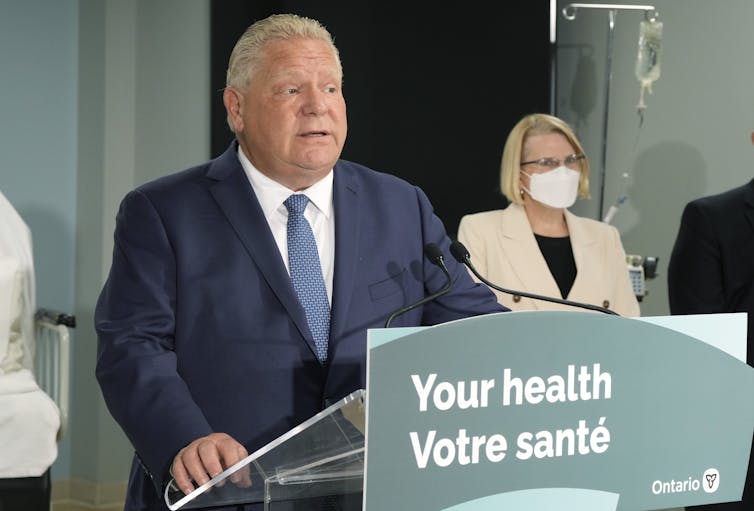Lead image by Shutterstock
By Greta Bauer, Ayden Scheim, Jose Navarro, Kai Jacobsen and Leo Rutherford
This article is republished from The Conversation under a Creative Commons licence. All photos provided by The Conversation from various sources.
Amid a crumbling health-care system and rising transphobia, trans and non-binary people in Ontario are facing a new challenge: reduced access to gender-affirming care. Changes to how the Ontario government funds virtual health-care services have led to the closure of a key resource, the Connect-Clinic.
The clinic provides vital health-care services, and its closure means fewer trans and non-binary people will get the life-saving medical care they need. Gender-affirming care providers should be exempt from these rate cuts to maintain trans and non-binary people’s access to health-care services.
Telehealth essential: Connect-Clinic closes
The Connect-Clinic is a specialized virtual clinic that provides gender-affirming care to trans and non-binary people across Ontario. The clinic provides hormone therapy and surgery referrals that many trans and non-binary people describe as life-saving. But the Connect-Clinic is now unable to provide virtual consultations because of recent changes to how doctors are paid for virtual appointments.
When the COVID-19 pandemic began, doctors were paid the same amount for an appointment by video or phone call as they were for an in-person appointment. This allowed for greatly expanded access to virtual care across Ontario.
But as of Dec. 1, 2022, the Connect-Clinic can only bill $20 for a video appointment and $15 for a phone appointment. Previously, the Connect-Clinic could receive $67 or more per appointment.

(Shutterstock)
The new reduced rates aren’t enough to cover the specialized care that the Connect-Clinic provides. As a result, the clinic has paused appointments for their 1,500 patients and closed their waitlist of over 2,000 trans and non-binary individuals.
Gender-affirming care saves lives
Gender-affirming care is essential to trans and non-binary people’s health and well-being. Research has consistently found that gender-affirming medical care significantly improves the mental health and quality of life of trans and non-binary people.
Based on a large survey of trans and non-binary people in Ontario, members of our Trans PULSE Canada research team found that having access to all desired gender-affirming medical care reduced suicidal ideation by 62 per cent.
Unfortunately, accessing gender-affirming care is difficult in Ontario. Services are provided through a patchwork of community health centres, hospital-based clinics and individual family physicians. Many clinics are dealing with long waitlists and demand that far exceeds capacity. Our own research found that one-third of trans and non-binary people who need gender-affirming medical care were on a waitlist.
The importance of virtual care
Virtual care can help bridge this gap. In 2020, our research team surveyed 820 trans and non-binary people in Canada. We found that 33 per cent of participants would prefer to access health care virtually rather than in-person once the COVID-19 pandemic was over.
Participants living with anxiety or chronic health conditions were even more likely to prefer virtual care. Our participants emphasized the importance of flexibility in access to both in-person and virtual care.
The Connect-Clinic has helped thousands of trans and non-binary people across Ontario access gender-affirming care through virtual appointments. Their services are especially important for people living in rural and remote areas who do not have any gender-affirming care providers in their area.
The closure of the Connect-Clinic has added even more stress to a health-care system facing already severe worker shortages and long wait times. Trans and non-binary people will suffer as a result.

THE CANADIAN PRESS/Frank Gunn
Telehealth: Compounding barriers to access
Even before the closure of the Connect-Clinic, trans and non-binary people in Ontario had a much harder time accessing health care than their cisgender (non-trans) peers.
While all primary care providers are able to prescribe hormone therapy and refer patients to surgeons, gender-affirming care is rarely covered in medical education, and many family doctors do not feel confident or experienced enough to provide gender-affirming care. As a result, many trans and non-binary people turn to specialized clinics, such as the Connect-Clinic.
In 2019, we surveyed nearly 3,000 trans and non-binary people from across Canada. We found that only 55 per cent of participants from Ontario had a primary care provider with whom they were comfortable discussing their gender. Furthermore, 42 per cent of Ontario participants had at least one unmet health care need in the past year.
In comparison, less than seven per cent of the general population said the same in 2019. The closure of the Connect-Clinic is likely to make accessing health care even harder for trans and non-binary people.
The need for an exemption to rate cuts
Other medical providers, such as those providing addiction medicine, were given an exemption from the physician services agreement. That exemption allows them to continue to be paid the same amount for virtual and in-person appointments.
Considering the unique needs of trans and non-binary patients, gender-affirming care must be provided the same exemption. Addiction medicine and gender-affirming care both require specialized expertise and non-stigmatizing providers that are not always available to patients locally.
Maintaining the previous billing rates for virtual visits is essential to enable the Connect-Clinic and other clinics to continue providing vital gender-affirming care for trans and non-binary people in Ontario.
![]()
Thursday, February 2, 2023 in The Conversation
Share: Twitter, Facebook



